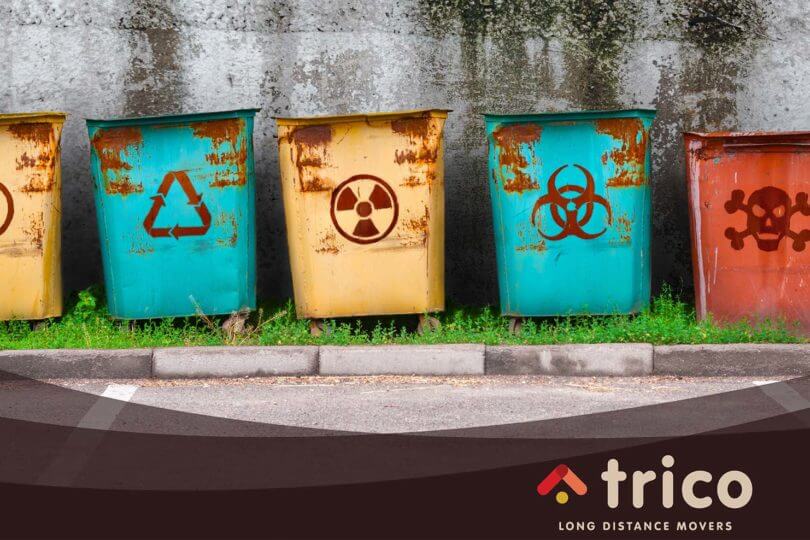If you’re currently going through the process of moving, especially a long-distance one, you would agree things can get hectic. You may even forget a few things, like, for example, that there are some items movers won’t move or pack. No one wants to go through the hassle of checking every box after packing for things that are prohibited, which is why we recommend you read our guide and discover what you can and cannot move.


How come there are things and materials around the house that relocation experts won’t handle? It’s simple: they may be hazardous materials, materials that are prohibited in certain states, things like food, pets, and plants that all have separate needs and require special kind of care during transport. So make sure you learn how to relocate your plants correctly and move with your pets before you call your movers to take care of your other stuff. We will touch on all of these and why they need a different channel for transport other than your chosen company.
You may find it curious, but we do have plenty of hazardous things lying around the house. These things can cause damage if they are spilled, lit on fire, or somehow altered. They need to be disposed of properly before relocating, or simply given away to someone.
These are the things that are corrosive, flammable or explosive, and they include some pretty obvious stuff like ammunition, loaded guns, and poisons. However, some seemingly benign items such as nail polish, nail polish remover, and household batteries also fall under this category. Here is a brief list of some other obvious or not so obvious things that are prohibited in the relocation industry:
As you can guess, some of these non-allowable items are definitely more dangerous than others, especially if you’re moving with kids. Almost every item on this list is considered highly flammable, and relocating such materials is forbidden in the relocation industry. Movers go through regular inspections and are not supposed to carry chemicals that can lead others or themselves into a potentially dangerous situation. Packing these may put your long-distance relocation specialists into awkward situations, which is why it’s best that you properly dispose of these materials. You can also give them out for free to friends and family members who could find a use for them.

Relocation companies cannot transport your food. Perishable things like fruit, veggies, meat, eggs have an expiration date, which makes them very sensitive and, therefore, difficult to move. If you planned to move your food via your movers, we have to disappoint you. It’s highly recommended that you give it away, donate, or get rid of it before movers even begin packing and relocating your household. Feel free to donate these to your nearest soup kitchen or a local homeless shelter that will be very grateful for your contribution.
Don’t try and sneak in some food with other things, as that may have catastrophic consequences to your furniture, home appliances, and other cargo. You don’t want to risk having to pay additional fines or damaging the rest of your property. We urge you not to try and look for clever ways to transport it, as they are not worth the trouble you will go through to move them.

We are not quite done with our ‘prohibited cargo’ list. Even though some things are strictly prohibited, some, like the following, fall into the category of “advisable not to pack.” The company might not have legal trouble moving and dealing with these things, but it would still be highly recommendable that you be the one taking care of these. This section is about things that are highly valuable, such as pieces of jewelry, to personal documents that really should not be lost during the move.
Even though these objects cause no trouble during transport, people have been known to find them missing, which is something relocation companies cannot be held accountable for. Here are short breakdowns of some of the things we better not stuff into containers going long distances:
If you can’t find a good option for money transfer, we are sorry to tell you that movers aren’t great for it too. They cannot take your stacks of cash and load them into our trucks, but they can give you a price quote free of charge. This way, you can know in advance how much your moving services will cost you so that you can set aside around as much money.
If you are a proud owner of a very expensive collection or a set of heirlooms, you might need to take some time to learn how to pack your antiques. We wouldn’t want to damage any of it, so we won’t risk it. But that doesn’t mean that there aren’t experts that can come to your home and take proper care of them.
If you have a large pile of documents and things of sentimental value, it’s best that you don’t part with them. We advise that you go through your home and arrange them all in one safe place, a basket or a folder that you can take with you when you leave. There are a lot of important trinkets as well, and some are even essential to us, such as keys, medication, or personal laptops. If you normally don’t leave home without it, we advise you add it to this pile.
Now that you know what items you’ll have to handle on your own, it is time to get a free moving quote. You can usually do it online by filling out a form on the movers’ websites, or you can contact your long-distance moving representatives to give you a quote for their moving services.